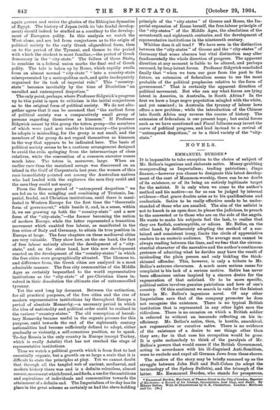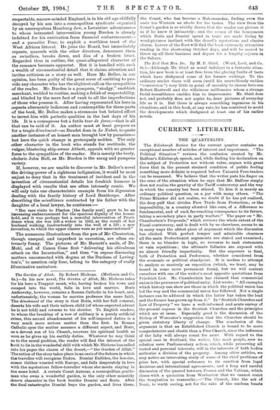IT is impossible to take exception to the choice of
subject of Mr. Belloo's ingenious and elaborate satire. Money-grubbing masquerading as Imperialism ; trading patriotism ; Jingo finance,—however you choose to designate this latest develop- ment of the cant of Mammon-worship, there can be no doubt of its existence, or of its being an entirely legitimate target for the satirist. It is only when we come to the author's method and his motive—so far as can be judged by internal evidence—that grave doubts arise as to his qualifications and credentials. Satire to be really effective needs to be under- standed of those who are assailed. The aim of the satirist is not to knock in an open door, to please the judicious, to preach to the converted or to those who are on the side of the angels. He wants to make his subjects feel the lash, to realise that they are foolish, contemptible, or odious. Mr. Belloc, on the other hand, by deliberately adopting the method of a sus- tained and consistent irony, limits the circle of appreciative readers to an esoteric audience. The average man cannot be always reading between the lines, and we fear that the circum- stantial character of the narrative and the author's continuous pretence of admiring what he derides may have the result of misleading the plain person and only tickling the thick- skinned offender. This, however, is only a tribute to Mr. Belloc's extreme cleverness. A much more serious cause for complaint is his lack of a serious motive. Satire has never been efficacious unless inspired by a sincere desire for the regeneration of that satirised. Or to be more specific, political satire involves genuine patriotism and love of one's country. Of this sentiment we search in vain for the faintest trace in Mr. Belloc's ingenious novel. Of any other Imperialism save that of the company promoter he does not recognise the existence. There is no typical British institution that is represented in any other light save the ridiculous. There is no occasion on which a British soldier is referred to without an innuendo reflecting on his in- efficiency. Mr. Belloe's satire, then, is hostile, anarchical, not regenerative or curative satire. There is no evidence of the existence of a desire to see things other than they are; for in that case his occupation would be gone. It is quite melancholy to think of the paralysis of Mr. Bellas powers that would ensue if the British Government, acting in accordance with his ill-disguised Anti-Semitism, were to exclude and expel all German Jews from these shores.
The motive of the story may be briefly summed up as the struggle between John Bull and Bull-Cohen (to adopt the terminology of the Sydney Bulletin), and the triumph of the latter. Mr. Emmanuel Burden, who stands for prosperous, * Emmanuel Burden, Merchant, of Thames Street in the City of London, Exporter of Hardware: a Record of his Lineage, Speculations, Last Days, and Death. By Belloc. With 34 Illustrations by G. K. Chesterton. London Methuen and Co. tea.) respectable, narrow-minded England, is in his old age skilfully decoyed by his son into a cosmopolitan syndicate organised by an unscrupulous Hamburg Jew, a Levantine, adventurer— to whose interested intervention young Burden is already indebted for his extrication from financial embarrassment—
and a parasitic Peer, to exploit a worthless tract of the West African littoral. He joins the Board, but immediately repents, quarrels with the other directors, denounces them as swindlers, breaks down, and dies of a broken heart. Regarded thus in outline, the quasi-allegorical character of the romance becomes apparent. But it is handled with such a wealth of circumstantial detail that it claims attention and invites criticism as a story as well. Here Mr. Belloc, in our opinion, has been guilty of the great error of omitting to pro- vide any character who has the slightest call on the sympathies of the reader. Mr. Burden is a pompous, "stodgy," snobbish merchant, wedded to routine, making a fetish of respectability, and blinded by the mere fact of rank to all the imperfections of those who possess it. After having represented his hero in aspects alternately ludicrous and contemptible for three-parts
of the book, Mr. Belloc makes a strenuous but belated effort to invest him with pathetic qualities in the last days of his life. It is a courageous but a futile tour de force,—that is all that can be said of it. An author must at least prepare us for a tragic denament—as Daudet does in Le Nabob, to quote another instance of an honest man brought low by parasites— but here the quick change is grotesquely sudden. The only other character in the book who stands for rectitude, the vulgar, blustering ship-owner Abbott, appeals with no greater
force to the sympathies of the reader. He is merely the beefy, choleric John Bull, as Mr. Burden is the smug and pompous If, however, we are unable to discover in Mr. Belloc's novel the driving-power of a righteous indignation, it would be most unjust to deny that in the treatment of incident and in the invention of circumstantial details his freakish humour is displayed with results that are often intensely comic. We will only take one characteristic example from his digression dealing with the family history of Lord Benthorpe. After
-describing the mesalliance contracted by his father with the daughter of a local lawyer, he continues :—
" Her rare visits to Placton [the family seat] grew to be an increasing embarrassment for the spacious dignity of the house- hold, and it was perhaps but a merciful intervention of Provi- dence when she was left a widow in 1852, as the result of her husband walking inadvertently into the well of a lift : a new invention, to which the upper classes were as yet unaccustomed?'
The numerous illustrations from the pen of Mr. Chesterton, though unequal, and imperfect in execution, are often ex- tremely funny. The pictures of Mr. Barnett's smile, of Dr.
Mohl, and of Canon Cone first "delivering his chivalrous attack on the Incarnation," and then "in repose discussing matters unconnected with dogma at the Duchess of Laving- ton's," to mention only four, belong to the category of really illuminative caricature.



















































 Previous page
Previous page